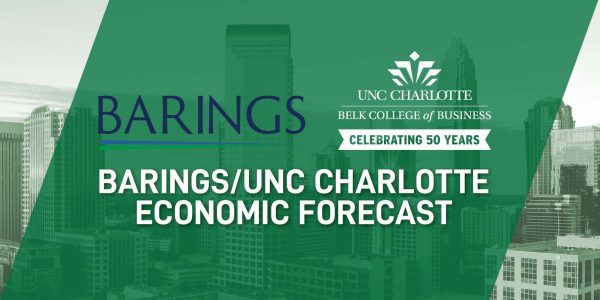North Carolina’s Economic Forecast: A Comeback in 2021

The new year could bring a resurgence for North Carolina’s economy, which took a historic hit this spring due to the COVID-19 pandemic, according to John Connaughton, director of the Barings/UNC Charlotte Economic Forecast.
“While 2021 represents the first full year of the economic comeback from the COVID-19 recession, it is likely to take until early 2022 before GDP (Gross Domestic Product) reaches the 2019 quarter four high point,” said Connaughton, Barings Professor of Financial Economics at the Belk College of Business. “Unfortunately, the unemployment rate will take another six to nine months before it again approaches 4.0%.”
Connaughton – presenting his quarterly Barings/UNC Charlotte Economic Forecast on Wednesday, Sept. 23 – said 13 of 15 economic sectors in North Carolina are forecast to experience output decreases in 2020.
Hospitality and Leisure Services will see the largest decline, a projected real decrease of 32.8%, followed by:
- Other Services: 7.4% decrease
- Educational and Health Services: 5.9% decrease
- Wholesale Trade: 4.7% decrease
Looking ahead to 2021, Connaughton forecasts an output increase for all 15 of the state’s economic sectors. According to the report, these sectors will see the largest real increase in 2021:
- Hospitality and Leisure Services: 11.5%
- Other Services: 9.7%
- Agriculture: 6.6%
- Educational and Health Services: 5.9%
Gross State Product
After decreasing 25.8% in the second quarter, the Gross State Product (GSP) is expected to rebound during the third quarter, Connaughton said. In the fourth quarter of 2020, GSP is expected to increase by an annualized real rate of 6.6%.
Looking ahead to 2021:
- Gross State Product (GSP) is forecast to reach $595,833.0 million, a real (inflation-adjusted) increase of 3.6% over the 2020 level.
- The quarterly GSP is expected to increase each quarter of 2021, starting with a 5.9% annualized real rate increase in the first quarter.
Employment
Since April, the U.S. and North Carolina unemployment rates have fallen dramatically. The North Carolina rate, at 8.6% in July, is expected to decline through the rest of the year to 7.1% in December, Connaughton said.
For the year, Connaughton expects the state will lose 219,600 net jobs, and 12 of the state’s 14 nonagricultural sectors of the economy are expected to experience employment decreases. The sectors with the largest expected employment decreases are:
- Hospitality and leisure services: 16.8% decrease
- Transportation, Warehousing and Utilities: 7.3% decrease
- Retail Trade: 7.0% decrease
Looking ahead to 2021:
- North Carolina’s unemployment rate is expected to decline to 5.4% by December 2021, still higher than the pre-COVID rate of 3.6%.
- Seasonally adjusted nonagricultural employment is expected to reach 4,610,800, an increase of 5.4% over December 2020.
- The state is expected to add 236,500 net jobs for the year.
- Thirteen of the state’s 14 nonagricultural sectors of the economy are expected to see employment increases, with Hospitality and Leisure Services (15.9%) and Information (16.0%) seeing the largest increases.
COVID-19 Recession
The COVID-19 shutdown ended a North Carolina economic expansion that began in 2010.
Connaughton, who has served as forecast director since 1981, said the 2020 recession, caused by the mandated shutdown of many sectors of the economy, is markedly different from recent recessions.
“The COVID-19 recession resulted in a more severe downturn than what we experienced during the Great Recession in 2008,” he said. “In most recessions, the cause comes from an imbalance in one or more sectors of the economy.”
The full report is available on the Barings/UNC Charlotte Economic Forecast webpage. Connaughton will release the next Barings/UNC Charlotte Economic Forecast report on Dec. 10.
Green and Gold Drive Business
The Belk College of Business at UNC Charlotte has been driving business for more than 50 years. Established in 1970, the college offers outstanding business education programs at the undergraduate, master’s, doctoral and executive levels. The Belk College is one of the Carolinas’ largest business schools, with more than 4,600 students, over 100 full-time faculty, and more than 33,000 alumni. Accredited by AACSB International, the college is committed to building strong partnerships in the greater Charlotte region and beyond as North Carolina’s urban research business school. Learn more about how the Belk College is driving business at belkcollege.charlotte.edu, and on LinkedIn, Facebook, Twitter and Instagram.
About Barings
Barings is a global financial services firm with more than $346 billion in assets under management and over 2,000 associates who are dedicated to meeting the evolving investment and capital needs of the firm’s clients and customers. Through active asset management and direct origination, Barings provides innovative solutions and access to differentiated opportunities across public and private capital markets. The firm’s global headquarters is located at 300 South Tryon in Charlotte, and it maintains a strong international presence with business and investment professionals in offices throughout North America, Europe and Asia Pacific.